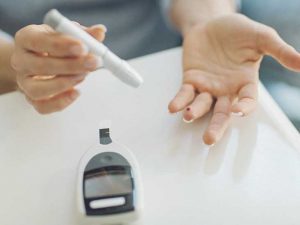BSR in diabetes mellitus
Vascular complications of diabetes are a major cause of early disability and mortality. The leading risk factor for the development of angiopathies, in particular atherosclerotic lesions, are lipid metabolism disorders. The issues of the use of drugs and food additives in the treatment of diabetes mellitus remain relevant. The aim of the study was to study the effectiveness of the BSR food supplement. This food supplement is a dry biomass of a mycelium. BSR is used as a biologically active nutritional supplement in therapeutic nutrition.

In addition, the state of the cardiovascular system (according to ECG), the pulmonary system, and, if necessary, the state of the excretory, musculoskeletal, and other systems were evaluated.
The state of carbohydrate metabolism was controlled by the glycemic profile (determination of blood glucose at 6 °°, 9 °°, 13 °°, 18 °°, 21 ° ° and, if necessary, 3 °°) and daily glucosuria (usually a combination with the day of determination glycemic profile), as well as the content of glycosylated hemoglobin before treatment and after 1 month of use of BSR.
Patients suffering from type I diabetes mellitus were treated with insulin at an average dose of 40.15 ± 8.88 units until the examination period. per day. Patients suffering from type II diabetes mellitus were on combination therapy (insulin in an average dose of 23.77 ± 18 units per day and tablets containing hypoglycemic agents) or in oral therapy with hypoglycemic drugs in a daily dose of 10.04 ± 1.32 mg (in conversion to glibenclamide).
BSR was prescribed as a dietary supplement, i.e. taking 0.5 tablet, and after 2 days, 1 tablet. (0.2 g) during meals twice a day (morning and evening).
Thus, during the reception of BSR, the main indicators of the general analysis and blood biochemistry remained within the normal range and did not change during treatment, which indicates the absence of any side effects on the function of the liver, hematopoietic and other systems.
Of particular interest was the effect of BSR on the state of carbohydrate and fat metabolism.


There is a downward trend in cholesterol, triglycerides and low-density lipoproteins, although normalization of these indicators during the use of BSR does not occur. It should be noted that in this case, against the background of taking BSR, there is a decrease in high-density lipoproteins (even slightly lower than normal), although this decrease is unreliable and does not always happen.
A similar trend in the dynamics of lipid concentration in patients with type II diabetes mellitus is observed in the same degree of severity as in patients with type I diabetes mellitus.
It should be noted that almost all patients noted a subjective improvement in overall well-being, increase in physical and mental activity.
Based on the studies, it can be noted that while taking BSR, metabolic processes, including carbohydrate and lipid metabolism, are improving. Most likely, the main influence of BSR is through the immune system, having an immunomodulating and immunocorrecting effect, which was shown in experimental studies.
